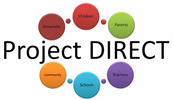Externalizing problems in young children can prove to set classroom-wide obstacles in creating an effective learning environment for all children. Externalizing behaviors can be described as any act of disruptive behavior that associates with difficulties in a child’s life such as family abuse, crime, and psychiatric disturbance. In this study, programs aimed to reduce externalizing behavior in classrooms were utilized. Tackling these externalizing behaviors seeks to improve a child’s receptivity for learning and in turn eliminates the exacerbation of these behaviors into children’s adult lives.
Namely, two programs were used to tackle these externalizing behaviors. In the first, an program called The Incredible Years had children watc short videos in which social situations are modeled. The students then discuss how they would have acted in such a situation and practice these actions with a teacher and parent. Between these sessions, children would work on homework regarding the themes of appropriate prosocial reactions. The second program, which focuses on academic improvement, was Dialogic Reading. In Dialogic Reading, students (3-5 at a time) and teachers read a picture book together. Students would also read individual with their parents at their own homes.
Results from these intervention programs showed promise, with over 85% of parents satisfied with the outcomes of the programs. Specifically, The Incredible Years saw improved circle time, which allowed for more time on planned academic activities and less time focused on gathering the children’s attention. In addition, Dialogic Reading had broad positive effects on adult-student interactions.
No research study is perfect, but considering the challenges placed by this experiment allows for better improvement of future experiments. For example, the workshop which debriefed the skills needed by teachers for these programs was offered for only one day. Thus, improvement of carrying out these programs would best improve if more time were given to train these teachers. In addition, participation in the programs was limited to the competing demands that families face every day. It helps that food and child care were offered, but future directions could look at what could make access to participating in the study even easier. Finally, the concern of extrinsic motivation arose in some of the parents, worrying that their children would not want to work on their externalizing behavior for the sake of bettering themselves, but rather to earn a reward. This facet of the program eventually decreased after some time.
With this, these programs of addressing externalizing behavior show promise in addressing exacerbating classroom problems, leading to more effective learning within preschools.
Arnold, D. H., Brown, S. A., Meagher, S., Baker, C. N., Dobbs, J., & Doctoroff, G. L. (2006). Preschool-based programs for externalizing problems. Education and Treatment of Children, 29, 311-339. pdf
Namely, two programs were used to tackle these externalizing behaviors. In the first, an program called The Incredible Years had children watc short videos in which social situations are modeled. The students then discuss how they would have acted in such a situation and practice these actions with a teacher and parent. Between these sessions, children would work on homework regarding the themes of appropriate prosocial reactions. The second program, which focuses on academic improvement, was Dialogic Reading. In Dialogic Reading, students (3-5 at a time) and teachers read a picture book together. Students would also read individual with their parents at their own homes.
Results from these intervention programs showed promise, with over 85% of parents satisfied with the outcomes of the programs. Specifically, The Incredible Years saw improved circle time, which allowed for more time on planned academic activities and less time focused on gathering the children’s attention. In addition, Dialogic Reading had broad positive effects on adult-student interactions.
No research study is perfect, but considering the challenges placed by this experiment allows for better improvement of future experiments. For example, the workshop which debriefed the skills needed by teachers for these programs was offered for only one day. Thus, improvement of carrying out these programs would best improve if more time were given to train these teachers. In addition, participation in the programs was limited to the competing demands that families face every day. It helps that food and child care were offered, but future directions could look at what could make access to participating in the study even easier. Finally, the concern of extrinsic motivation arose in some of the parents, worrying that their children would not want to work on their externalizing behavior for the sake of bettering themselves, but rather to earn a reward. This facet of the program eventually decreased after some time.
With this, these programs of addressing externalizing behavior show promise in addressing exacerbating classroom problems, leading to more effective learning within preschools.
Arnold, D. H., Brown, S. A., Meagher, S., Baker, C. N., Dobbs, J., & Doctoroff, G. L. (2006). Preschool-based programs for externalizing problems. Education and Treatment of Children, 29, 311-339. pdf

 RSS Feed
RSS Feed